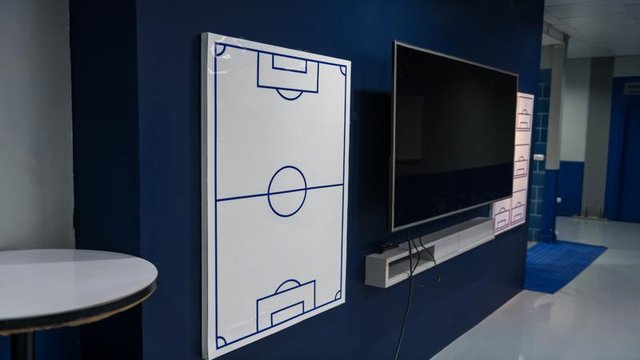
Virtual reality in football: How is it used?
July 31, 2024

Virtual Reality (VR) has emerged as a transformative force in various industries, and football is no exception.
The growth of VR in football has been exponential over the past decade, reshaping training methodologies, fan engagement, and even strategic management. From humble beginnings as a niche technology, VR has become integral to modern football, driven by advancements in hardware, software, and a deeper understanding of its potential.
In this post, we’ll look more in detail at how VR has changed the landscape within football. And if you are keen on a career combing new technologies and sport, you should consider the master in Football Coaching Online at Escuela Universitaria Real Madrid – Universidad Europea.
VR in coaching and management
One of the most significant impacts of VR in football is in coaching and management. Traditional methods of training and strategy development are being supplemented and, in some cases, replaced by VR solutions.
Tactical training
Coaches are utilising VR to develop players' tactical awareness. For instance, Liverpool have incorporated VR to simulate match scenarios, allowing players to experience and analyse complex game situations from different perspectives without the physical strain of on-field practice. This method enhances cognitive skills, decision-making, and spatial awareness.
Injury rehabilitation
VR is also revolutionising injury rehabilitation. Clubs like Manchester United have adopted VR systems that enable injured players to undergo virtual training sessions that mimic real-life drills. This approach helps maintain their mental sharpness and tactical understanding while they are physically sidelined, ensuring a smoother transition back to full fitness.
The technology behind VR in football
The implementation of VR in football relies on several cutting-edge technologies:
- Head-Mounted Displays (HMDs): Devices like the Oculus Rift and HTC Vive offer immersive experiences, crucial for training simulations.
- Motion Capture Systems: These systems track players' movements, translating them into the virtual environment to create realistic and accurate simulations.
- 3D Cameras and Sensors: Used for creating high-definition, 360-degree footage of matches and training sessions.
- Software Platforms: Companies like Rezzil and Beyond Sports develop specialized software that allows coaches to create and analyse virtual training scenarios.
Benefits of VR in football
The benefits of VR in football are multifaceted, impacting players, coaches, and clubs alike.
- Enhanced training efficiency: VR enables more efficient and targeted training sessions. Players can repeatedly experience specific scenarios, allowing for focused skill development without the risk of injury. This repetitive, controlled environment is ideal for honing techniques and strategies.
- Improved decision-making: By simulating real-game situations, VR helps players improve their decision-making skills under pressure. This cognitive training is crucial in developing quick, strategic thinking essential for high-level competition.
- Fan engagement: Beyond the training ground, VR is enhancing fan engagement. Clubs are offering virtual stadium tours and immersive match-day experiences, allowing fans worldwide to feel closer to the action. This not only boosts fan loyalty but also opens new revenue streams.
Boost your career at Escuela Universitaria Real Madrid
As VR technology continues to evolve, the demand for professionals who can effectively integrate these innovations into football coaching and management is rising. Pursuing a master in Football Coaching and Management in Madrid can be a game-changer for your career, equipping you with the skills to lead this technological revolution.
Comprehensive Skill Set
A master’s programme provides a deep understanding of both the theoretical and practical aspects of football coaching and management. You will learn about advanced training methodologies, sports science, and strategic management, all of which are crucial for leveraging VR technology effectively.
Leadership and Innovation
The programme also focuses on developing leadership and innovation skills. As VR becomes more prevalent, clubs will need forward-thinking leaders who can spearhead its integration. Graduates will be well-positioned to take on roles such as VR training coordinators, performance analysts, and strategic managers.
Networking Opportunities
Enrolling in a master’s programme such as a master in Sport Technologies and Digital Transformation or a Course in Big Data and Ai in Sports Management offers valuable networking opportunities with industry professionals, coaches, and technologists. Building these connections can be instrumental in staying ahead of technological trends and securing key roles within top clubs and organizations.
Virtual Reality is undeniably transforming football, offering new ways to train, manage, and engage. As this technology continues to evolve, the opportunities for innovation in coaching and management are immense. By pursuing a specialised course or master's programme, you can equip yourself with the necessary skills to lead this change, driving forward the future of football in a virtual era.